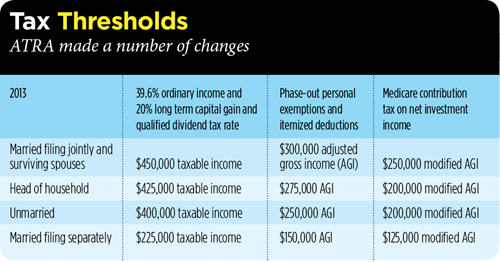Winning by Not Losing YearEnd Tax Management for the HighNetWorth Client
Post on: 16 Март, 2015 No Comment

Advertisement
Rule number one: never lose money. Rule number two: never forget rule number one.
Warren Buffett may or may not have had taxes in mind when he uttered this quotable phrase, but proactive tax planning is one of the most important things a financial advisor can do to help clients follow Mr. Buffetts number-one rule. When advising high-net-worth clients with robust retirement assets of at least $1 million or more, its more important to focus on protecting wealth from losses including substantial expenses like taxes than chasing returns.
High-net-worth clients, particularly those approaching retirement, have already won the game. They have successfully built sufficient wealth to maintain their standards of living and achieve their financial goals. Taxes can be the single biggest investment expense they will ever face. What else is going to cost 40% or 50% of their income every single year? Understanding how to navigate the tax landscape and being perceived by clients as an expert in this area is a differentiator for any advisory firm. Advisors who do not educate clients on managing taxes, or find a qualified partner to fulfill this role, should expect to lose business to one that does.
While tax planning should be a top priority throughout the course of the year, there are important opportunities for you to consider at year end. Now is the time to reduce your clients current tax obligations and develop a strategy for managing taxes over the next 12 months to protect more of the financial assets they worked so hard to achieve.
The Benefits of Tax-Deferral: One way to reduce tax expenses is to achieve more tax diversificationdiversifying between different tax rates, different types of taxes, and when to pay them. Managing clients portfolios within a tax-deferred vehicle like a qualified plan or a low-cost variable annuity is a simple solution. Many advisors labor under the misconception that the cost of variable annuities is too high. But today there are low-cost, no-load VAs designed specifically to provide clients with more tax deferralwithout commissions, excessive asset-based fees and complicated insurance guarantees. The fees for todays low-cost VAs are a very small price to pay when compared with the tax savings and additional accumulation achieved over many years of tax-deferred compounding.
Asset Location for Tactical and Alternative Strategies: It is critical to preserve wealth by avoiding market losses. Consider that an investor who makes only 30 percent of the S&P 500s total market gainsbut can avoid all of the losses will still outperform the market overall.
Advisors can actively manage clients assets to protect against market downturns through a process we call unconstrained investing. Aim to invest at least one third of clients portfolios in tactically managed assets uncorrelated to the traditional stock and bond markets. Seek alternative investments that can mitigate down-market risks and also generate alpha. While finding managers who can do both are rareit is well worth the added due diligence.

But tactical management and alternative strategies can be tax-inefficient due to high turnover and short term capital gains. So locate these strategies in a tax-deferred vehicle, to preserve all of the upside without any tax drag. Asset location lets you manage the way you want, protect wealth, make more moneyand you dont kill your client with taxes.
Taking advantage of tax-deferred investing vehicles and using asset location to optimize tactical management and alternative strategies are two of the most important steps advisors can take to manage taxes and preserve wealth. Other tax considerations that are relevant to high-net-worth, especially at year end, include the following:
- Health Care Surtax: Be especially proactive this year. Its the number-one new challenge. High-net-worth clientsor anybody earning over $200,000 a yearis subject to the surtax. And the costs add up. As an example, if a client lives in the state of California, which has the second highest capital gains tax rate in the world, when including the surtax of 3.8% you could actually pay an effective combined state and federal capital gains tax rate of 33%. Using tax deferral for capital gains is a meaningful way to mitigate this issue, as long as its a low-cost, no-load tax-deferred vehicle.
- Tax-Loss Harvesting: Leverage tax-loss harvesting to achieve tax alpha, especially at year-end. This is another approach to offset capital gains and preserve wealth, effectively increasing the rate of return on a portfolio between one and four percent.
- Roth Conversions: Resist the temptation to do a Roth conversion before retirement. It could cause bracket creep by moving clients into a higher tax bracket. A Roth IRA can be an important tax-free source of income for clients in later yearsand they can save more on taxes by waiting until retirement to do conversions, when they will most likely be in a lower bracket.
- Defined Benefit & Pension Plans. Many high-net-worth clients built their wealth through a successful business. And one of the best tax planning solutions for business owners at closely-held companies is creating a good pension plan. You help clients put away hundreds of thousands of dollars, reduce taxes, and fund retirementall in one vehicle. And it is asset-protectedprotected from any personal liabilitywhich is particularly beneficial to clients in high-risk professions.
The competition for high-net-worth clients continues to increase. And to win this business, it is more important than ever to differentiate yourself from the pack. Demonstrating your expertise in tax planningand putting it to work to protect clients wealth from the single biggest expense they can faceshould be a top priority all year long, and especially at year-end. Using simple effective tools like tax deferral and low-cost no-load VAs can help clients achieve tax-diversification, optimize the performance of tactical and alternative strategies, and mitigate the impact of capital gains. Your clients may not be as flush with cashor as eager to pay taxes as Warren Buffet, but they will certainly appreciate your dedication and expertise to help them follow his number one rule.














